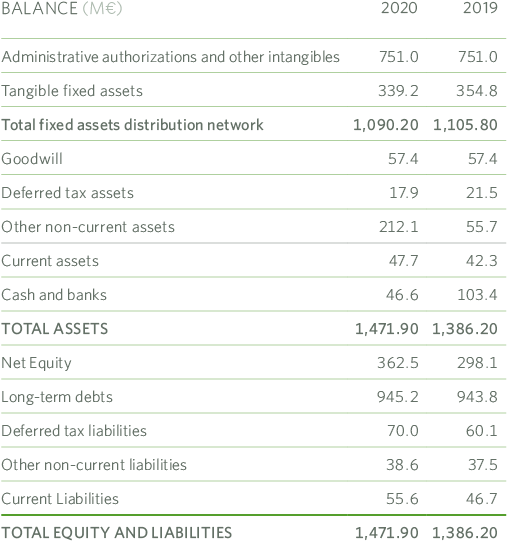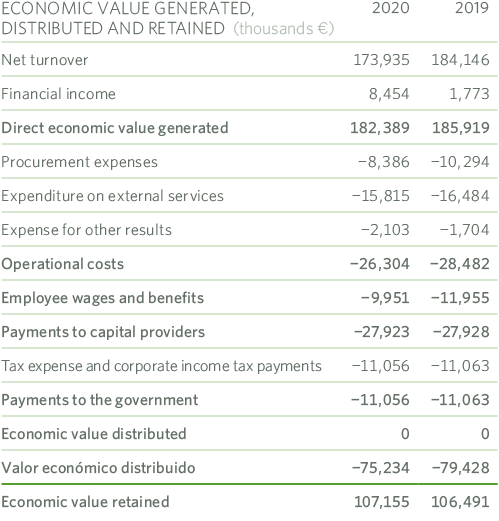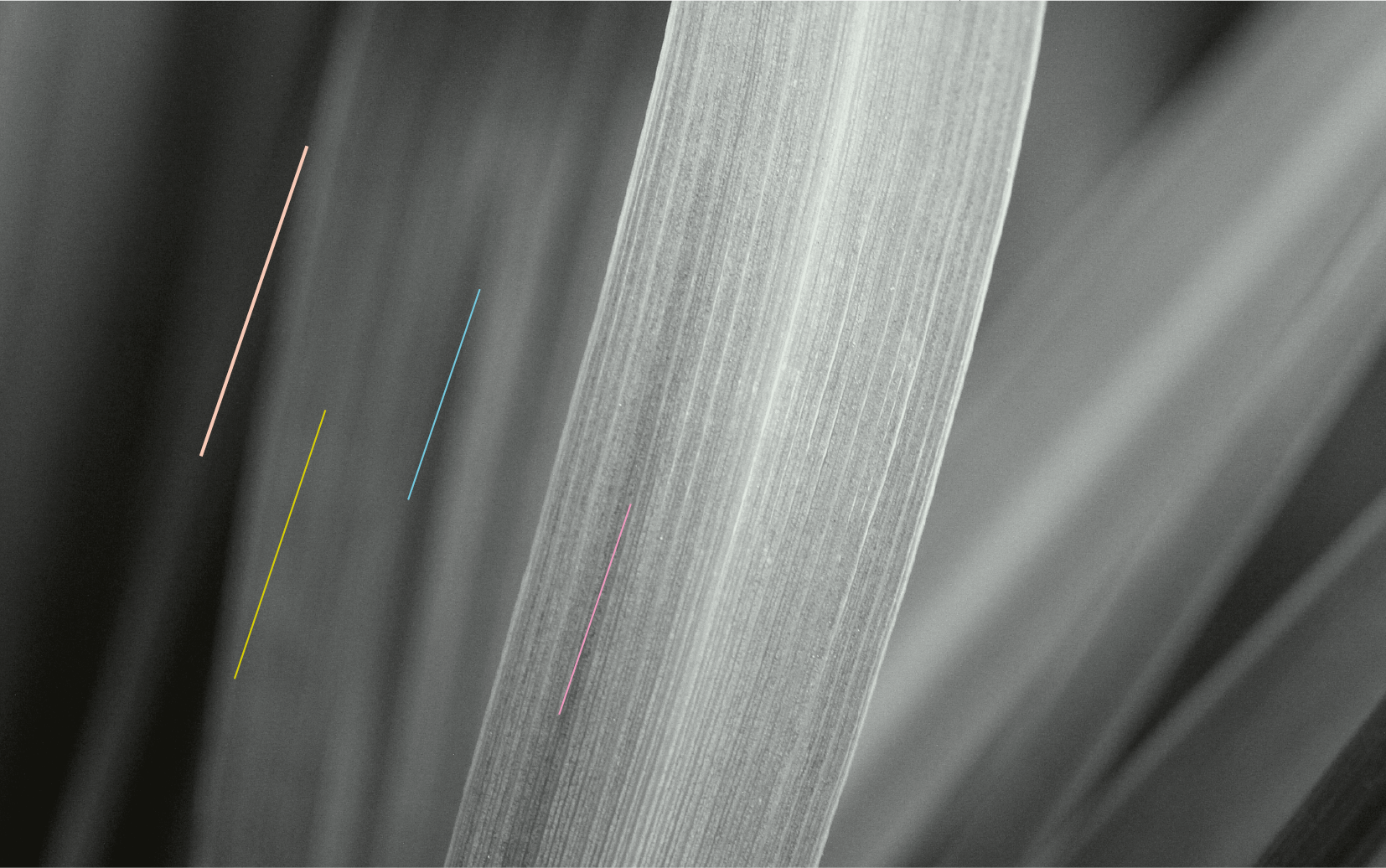4.1 Risk Management
Madrileña Red de Gas has a Risk Management Model with a comprehensive and systematic approach. The integration of risk management policy in the Company has been articulated through the progressive implementation of transversal risk analyses. These analyses involve the business and corporate units most closely linked to the processes affected by the risks, with the support of the finance and corporate risk management areas. This analysis is validated by Management through the Risk Committee (Committee made up of Management and the Head of Risk Management).
MRG’s risk management function is managed on a day-to-day basis by the corporate risk manager, who coordinates the objectives and information received from the business and corporate units, analysing and reporting to the Risk Committee, where the different mitigation plans are implemented. The report to the Audit and Risk Committee (Committee with representation of the four partners of Elisandra Spain IV, S.L, para. 2.4), facilitates its general monitoring of the risk map, going into the most significant risks and their evolution, recommending improvements and supporting the existing mitigation plans.
Risk management in MRG is not limited to the identification of events that represent risks, but also includes those that represent opportunities that the organization can avail of.
MRG has adopted a self-developed methodological approach inspired by Enterprise Risk Management (also known as COSO II) and the ISO 31000 Risk Management standard. All of this is standardised and documented through MRG’s internal regulations, published in the digital document management repository.
At present, MRG’s risk map includes the ten most common risks, which are evaluated by applying criteria based on:
- The probability of occurrence of a risk on a scale of one to ten.
- The impact of the combined effect on net present value and reputational damage, both on a scale of one to ten.
The map takes into account emerging risks through regular updates of its contents. It also establishes new high-level controls in addition to the existing ones.
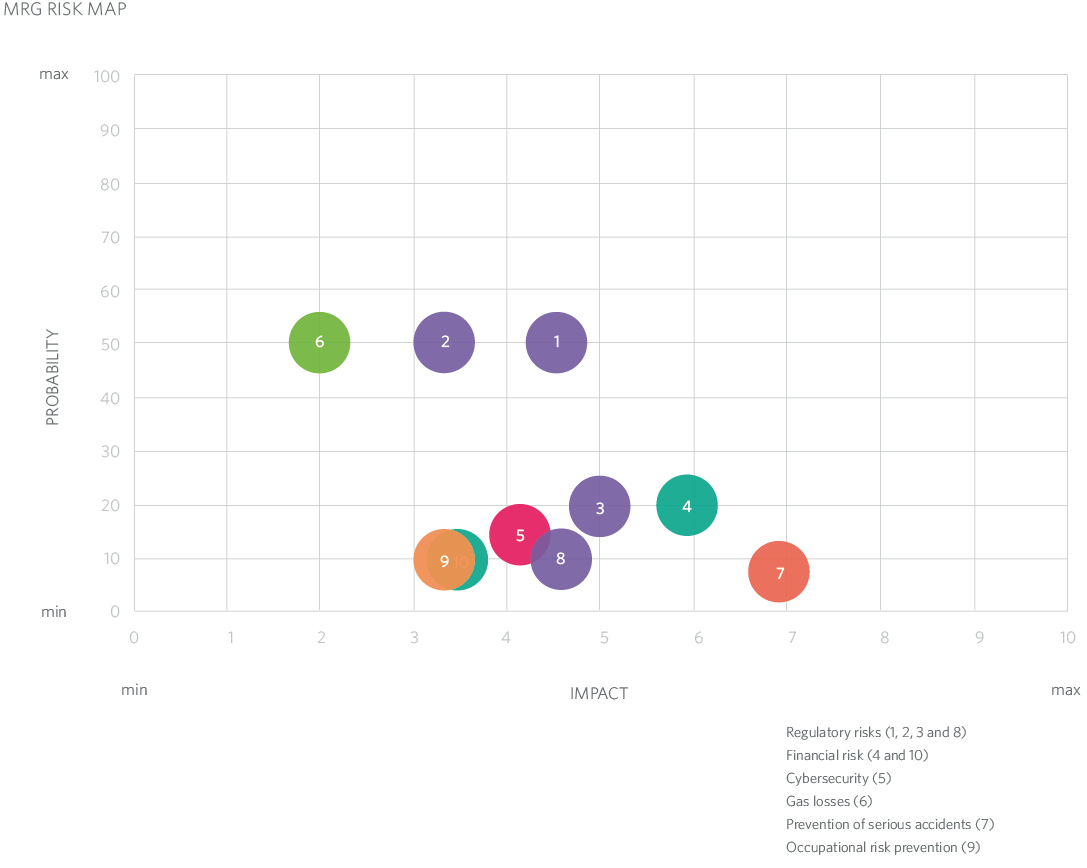
All risks represented in the graph are perfectly assumable by the company.
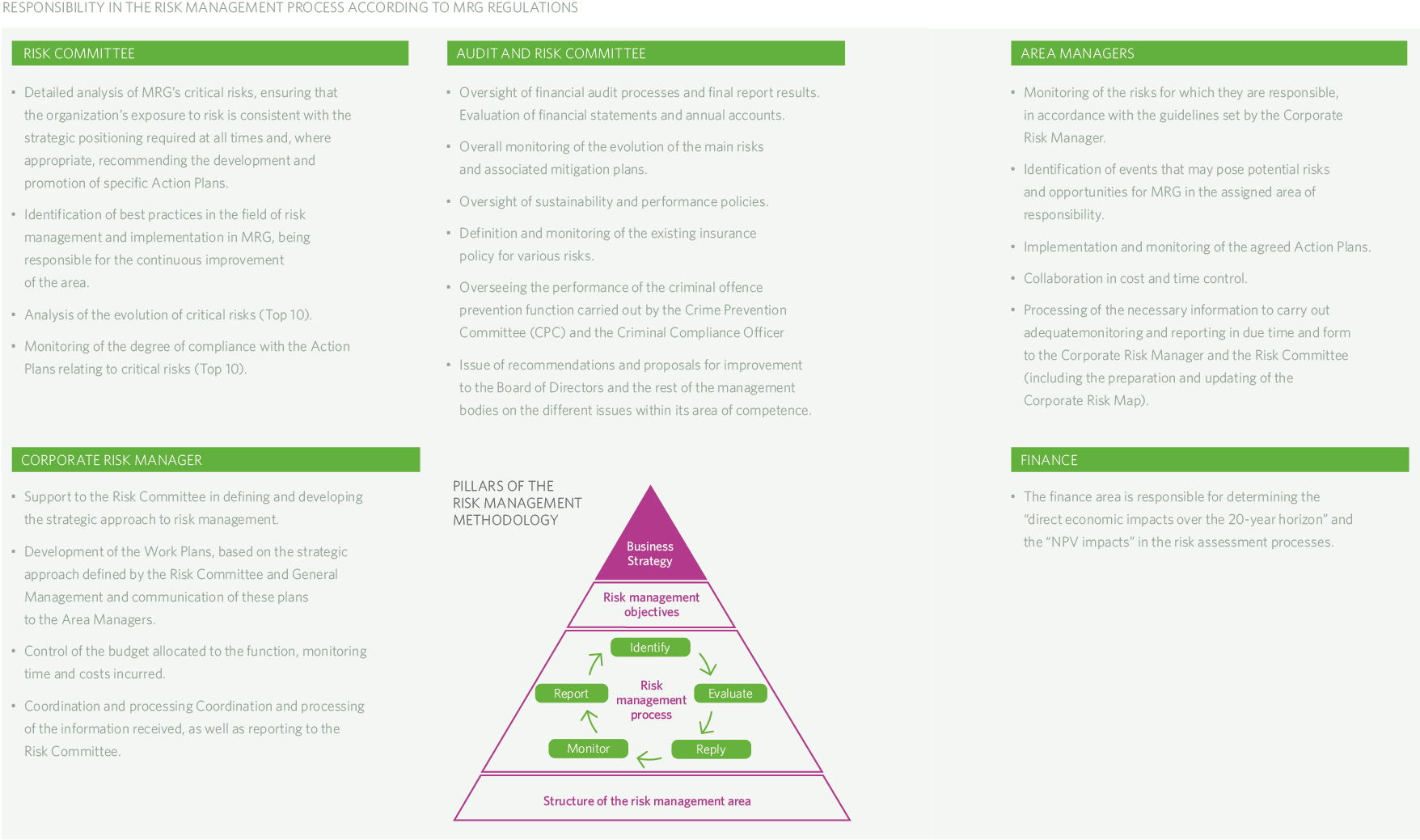
Specific risk map related to the pandemic caused by Covid-19
Due to the pandemic caused by Covid-19, a specific risk map has been defined that considers financial profile risks such as potential impacts on operating profits, liquidity and credit risk; as well as other risks related to difficulties in carrying out interventions in the homes of users affected by the pandemic, availability of resources for the continuity of operations and failures in the supply chain.
Identification of sensitive supply points
The fact of the pandemic has led MRG to pay particular attention to the sensitive supply points connected to our distribution network listed in point 2.3, Our Business, and to stress the importance of ensuring a guaranteed supply to users.
It is imperative to highlight the sensitive supply points belonging to the healthcare sector connected to our gas distribution network. These points are set out in section 2.3, Our Business.
Contingency and Business Continuity Plan for Covid-19
In response to Article 17, which declares a state of emergency for the management of the health crisis situation caused by COVID-19, and in which the activities carried out by MRG are considered essential, the Risk Management Unit developed the contingency and business continuity plan for the COVID-19 pandemic, which was communicated to the General Directorate of Industry of the Community of Madrid on 10 March 2020. In the development of the business continuity plan, the possible situation of having to extend the level of cooperation of the usual (and alternative) suppliers in order to guarantee the continuity of essential services was considered. Likewise, the replacement-covering plan was also drawn up with internal personnel who were trained to perform the functions considered as critical.
Likewise, this Risk Management Unit was periodically notifying the General Directorate of Industry, Energy and Mines of the Community of Madrid (DGI) of its daily situation during the acute phase of the pandemic.
The evolution of events during the state of emergency was monitored by a crisis committee created for this purpose with the participation of General Management, Network Operations Management, Customer Operations Management, Expansion Management, Legal Services and Risk Management.
4.2 Main Challenges
The analysis of risks and opportunities implies a set of actions that allow the mitigation of risks, as well as the capacity to take advantage of opportunities. MRG works in a proactive way, committed to the sustainability of the Company.
4.2.1 Climate Change Strategy
For MRG, the potential threats from climate change manifest themselves mainly in two ways:
- Alignment with regulatory changes that establish national and European emission reduction targets, as well as with global challenges against climate change.
- The increase in temperature, which means milder winters, could reduce demand, given that our main line of business is gas to homes and property developments for heating and cooking.
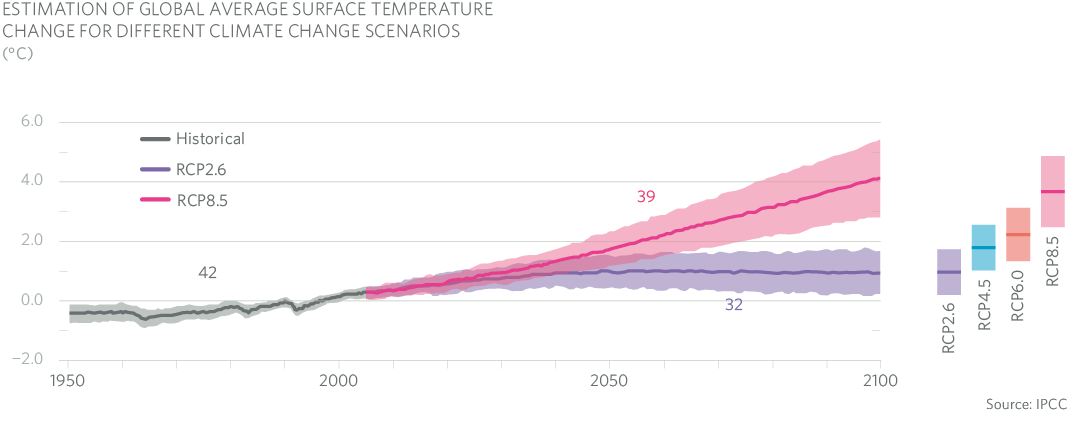
Both elements are highlighted in the risk analysis and assessment of MRG.
With regard to the reduction in consumption due to the increase in temperature, there is currently uncertainty in the climate models, which could in the worst case scenario lead to a reduction in heating consumption of 10% by 2040. In this calculation we have considered that the effect in the Community of Madrid will be milder than in the South of the peninsula and the coast.
In the short term, and with the experience of 2020, which has turned out to be the warmest year in the last decade, yet with consumption similar to previous years, demand is expected to be similar to current figures. The post COVID labour paradigm and the progressive move away from diesel and petrol are factored into our forecast.
MRG is working on four lines of mitigation:
- Conversion to natural gas of coal or diesel boilers in buildings (in line with government plans such as the 360 plan of the Madrid City Council or the Boiler Renewal Plan of the Community of Madrid), as well as supply points connected to LPG satellite plants.
- Participation in the promotion of new construction projects designed with a strong focus on increased energy efficiency (energy communities).
- Giving a strong boost to the mass consumer market, increasing the number of industrial customers. Helping in the energy transformation process.
- Promotion of renewable gases. Working on innovation projects to promote the integration of renewable gases.
This year 2020 we have signed four collaboration agreements for third party networks, for new housing. Under the auspices of energy communities, promoting self-consumption projects.
We are working on the study of a very innovative project in relation to new urban developments. This is the creation of an urban network (district heating & cooling) capable of providing hot water, heating and cooling and even lighting with renewable energy. The new neighbourhood to be developed in the municipality of Pozuelo de Alarcón is called Montegancedo.
In 2020 we have continued our plan to convert from LPG to Natural Gas as a sign of our commitment to our emissions reduction target. During 2020 we converted 707 homes to natural gas from a total of 27 piped propane installations despite downtime caused by lockdowns. And we continue to enter into commercial agreements to transform piped propane gas networks into natural gas networks.
In our drive towards the mass consumption market, we support companies in their energy transition processes towards self-consumption models. Large industry and the natural gas sector find in cogeneration technology a common territory where the benefit is mutual: savings, efficiency and sustainability for the former, and a large consumer for the latter. During 2020 we have started to supply a pharmaceutical company that has opted for cogeneration.
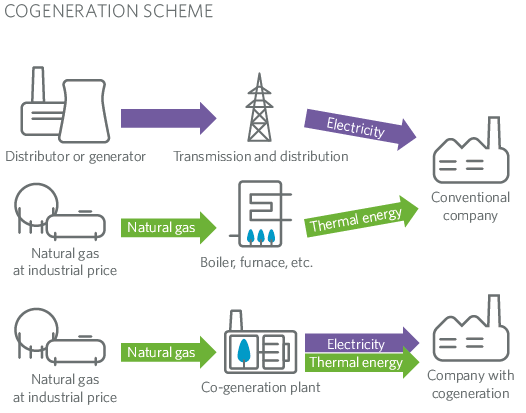
Based on MRG’s commitment to the environment and climate change, we are working hard on innovation projects to promote the integration of renewable gas into the energy mix. Renewable gases (biomethane, renewable hydrogen and synthetic gas) provide a substantial reduction in greenhouse gases, as well as helping to solve the problems of waste treatment and recovery, without the need for large investments in the gas network.
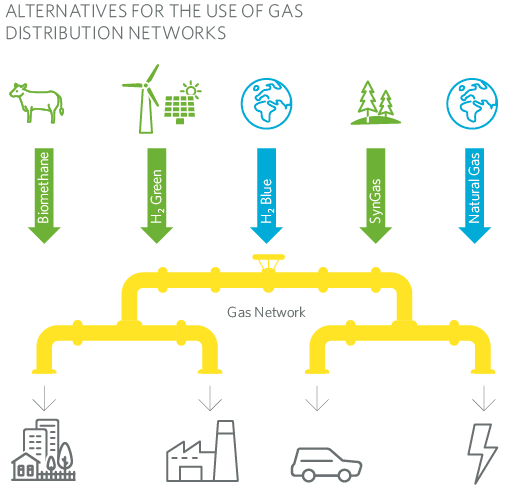
In our commitment to the development of renewable gases (biomethane, hydrogen, synthetic gas), we have signed a collaboration agreement with an engineering and consulting firm specializing in biogas plants, to jointly explore project opportunities for biomethane injection into the distribution network. In this regard, we have also worked with the main waste managers to seek synergies between companies with a common objective.
In addition, we continue to participate in the working groups organized by Sedigas and Gasnam for the development and promotion of renewable gas.
Furthermore, at the beginning of October, the Ministry for Ecological Transition and Demographic Challenge published the Hydrogen Roadmap, which establishes 60 measures with ambitious objectives to achieve emission neutrality by 2050, providing a medium and long-term vision for hydrogen deployment.
Given the strategic nature of renewable hydrogen, MRG has signed a collaboration agreement with a Spanish company of reference in hydrogen and fuel cell technologies, with the aim of developing green hydrogen projects. In addition, we are already part of the Spanish Hydrogen Association as a sign of support for the promotion of hydrogen, which is key to energy transition.
Hydrogen is a real solution in the medium and long term to decarbonize transport and achieve the sustainable mobility objectives of the Community of Madrid. In this important task, MRG is trying to establish a public-private collaboration framework in order to study the possibilities of transforming vehicle fleets and contribute to the development of recharging infrastructures.
Since 2019, we have had an agreement with Canal de Isabel II, which is promoting studies to potentially inject biogas from the treatment of its wastewater plants into the distribution networks.
The potential of hydrogen is considered to be much higher than that of biomethane, so its development is very important for sectors that are difficult to decarbonise. Both renewable gases can be transported through the gas infrastructure network, guaranteeing security of supply and enabling future decarbonisation.
4.2.2 Cybersecurity
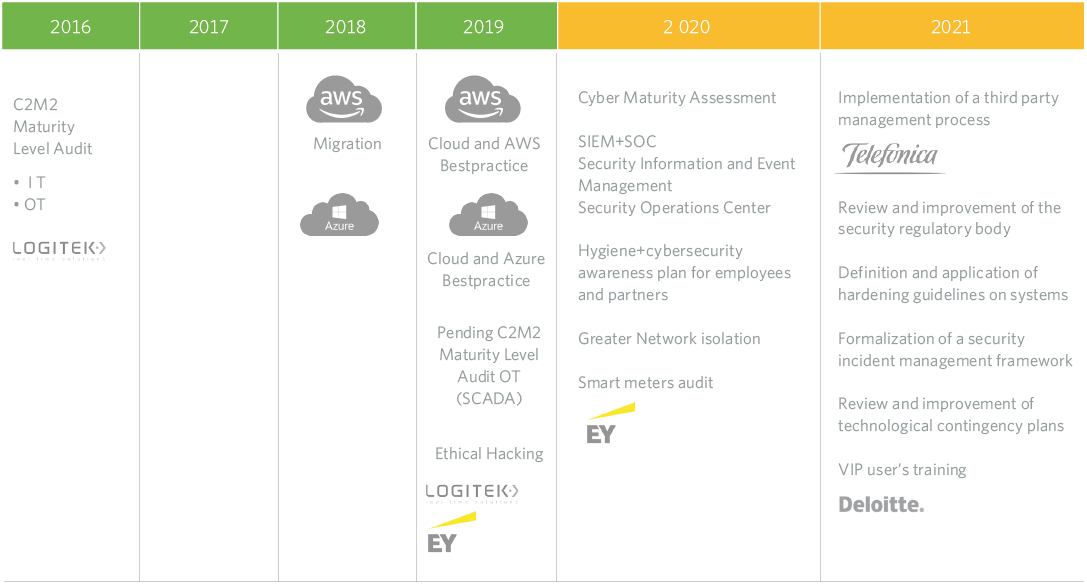
For Madrileña, this is an important element of risk that we have been working on in a systematic manner and with an ambitious plan since 2016. Proof of its importance is the existence of a Cybersecurity Committee.
The Committee, composed of two directors and five department heads, meets approximately every two months to review and communicate the cybersecurity policy, focusing on achieving the plan and especially on increasing end-user awareness.
During 2020 a consultation was conducted to analyze the maturity level of our organization, identify the required target level and review the action plan to achieve it. We can affirm that today the level is very close to that achieved by companies in the energy sector, although still far from the recommended level. The projects to be carried out by Madrileña Red de Gas to advance towards this target have been structured according to prioritized criteria, with a timetable in three progressive phases from 2021 to 2023. Each of these phases includes security projects in the four domains: governance, protection, surveillance and resilience.
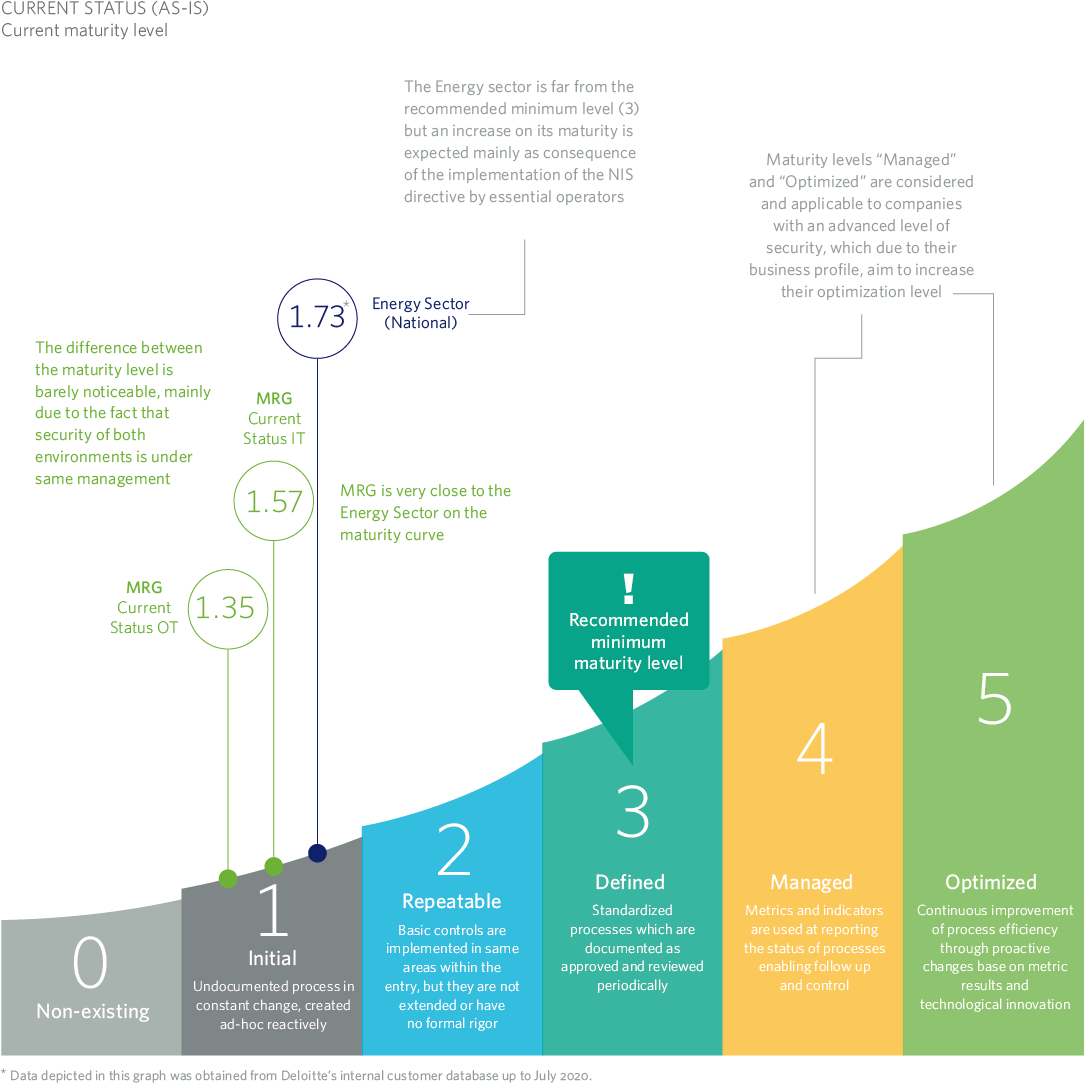
4.2.3 Serious Accidents
In Madrileña Red de Gas we have LPG liquefied gas plants in our facilities. Liquefied petroleum gas is a substance classified as hazardous, and is subject to R.D. 840/2015 for plants with storage capacity equal to or greater than 50 tons. This risk is part of the top ten risks in MRG.
Since 2016 we have been working on the development and implementation of a management system for the prevention of serious accidents in response to the requirements of the royal decree for this type of facility, as well as for any others that could potentially be affected by the regulations, taking advantage of the synergies with the integrated system of quality, environmental and occupational risk prevention.
In MRG we have established a serious accident prevention committee, whose main functions are the definition of policies and the implementation of the necessary criteria for their compliance. The committee is chaired by the General Manager and its members include Risk Management (Secretary) and the Human Resources, Network Operations, Business Development and Expansion Divisions. It meets at least once a year to review compliance, analyse possible incidents and propose objectives and improvement actions to strengthen the system.
The Serious Accident Prevention Management System takes advantage of the existing synergies with the rest of the integrated quality, environmental and prevention system. Objectives are defined for each year and the progress of the different actions is monitored periodically through the serious accident prevention committee. The wide variety of different requirements to be met by these facilities requires close collaboration between different areas of the Company.
Management activity has historically focused on the various maintenance activities, implementation of internal emergency plans, internal audits, regulatory inspections and notifications to the Competent Authorities.
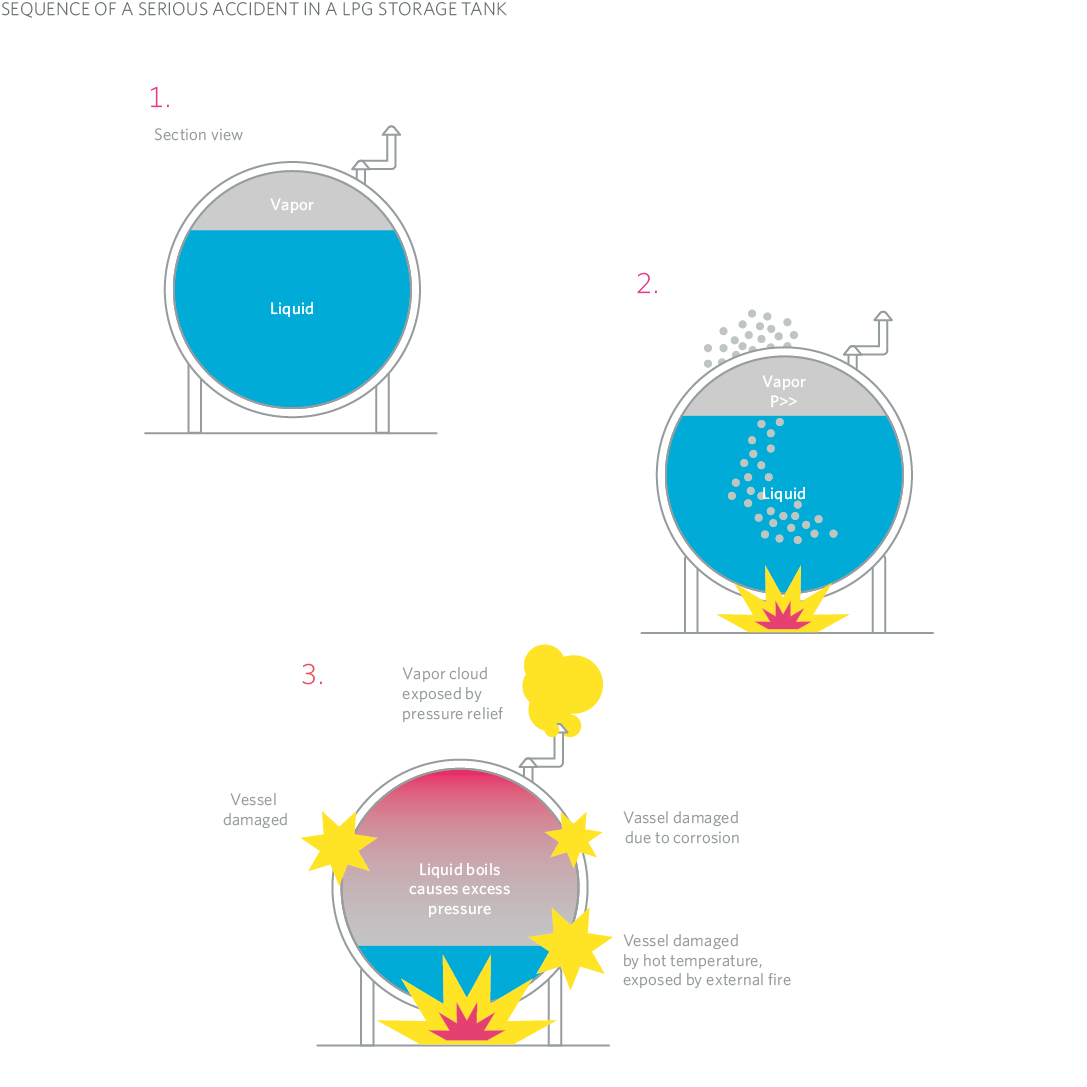
- Review of six internal emergency plans, which are then subject to verification by OCA.
- Information to the GDI on the situation of these assets; in particular, notification of the decommissioning of the Jardín de Alcalá LPG plant, due to its dismantling.
- Notification to Civil Defence of the Internal Emergency Plans of the facilities that remain operational, and which had previously been reported to the GDI.
4.3 Ethical Behaviour
Madrileña RED DE GAS believes that the trust of its investors, customers, suppliers and external collaborators, as well as the social environment in which it operates, is based on the integrity and responsibility in the professional performance of each of its employees. Ethics and compliance are therefore the cornerstones of the company’s operations.
Code of Ethics
Madrileña has a code of ethics whose purpose is to set out the guidelines that condition the ethical behaviour of all employees in their daily performance, with regard to the relationships and interactions that it maintains with all its stakeholders. This code is inspired by the definition of the Mission, Vision and Values of Madrileña Red de Gas and must be complied with by all the people who make up MRG, regardless of the position they hold.
Integrity is understood as acting ethically, honestly and in good faith. Professional responsibility is understood as acting proactively, efficiently and focused on excellence, quality and willingness to serve.
MRG expects all employees to behave with integrity and responsibility in the performance of their duties.
We also encourage suppliers and collaborators to behave in accordance with the criteria of integrity and behaviour based on our code of ethics.
The current edition is dated March 2016 and is periodically reviewed and updated by the Code of Ethics Committee, which takes into account the suggestions and proposals made by employees and the commitments made by MRG in terms of social responsibility and good governance. Approvals are carried out by the General Management.
- Promote the dissemination, knowledge and compliance with the Code of Ethics.
- Interpret the Code of Ethics and guide actions in case of doubt.
- Facilitate the resolution of conflicts related to the application of the code.
- Facilitate and manage communication channels, investigating any complaints that may arise, always ensuring the anonymity of the complainant.
- Report to the Governing Bodies on dissemination and compliance.
- Ensure compliance.
Complaints channel
Among the controls for identifying and acting in situations in which there are legislative breaches and/or practices contrary to the values and principles established in MRG’s code of ethics and anti-corruption policy, a Complaints Channel has been implemented with the collaboration of an independent service provider, available on the internet (www.canaldedenenuncias.com/madrileña), through which any member of our organization, regardless of their rank, responsibilities or geographical location, as well as the staff of any contractor or supplier of MRG, and any client or third party, can report any irregularity or behaviour contrary to the law, the Code of Ethics or the Anti-Corruption Policy, with the maximum guarantees of confidentiality and non-retaliation.
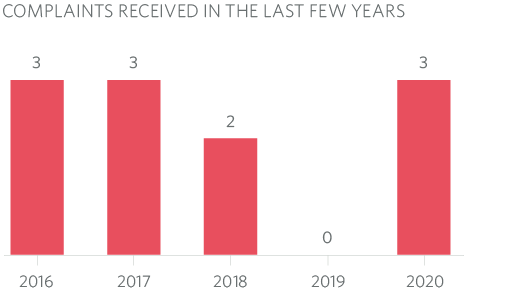
Of all the complaints received, only one was related to the Code of Ethics, and the appropriate measures were taken to resolve it. Of the remainder, two were related to labour matters and the remaining eight were “customer complaints” (who had mistakenly used the channel), all of which were channelled to the MRG Departments involved for resolution.
Preventing corruption and conflicts of interest
MRG is firmly committed to fighting corruption in all its forms, and to developing specific practices for its prevention, for which it has established an Anti-Corruption Policy. In this sense, MRG opposes influencing the will of people outside the Company to obtain any benefit through the use of unethical practices, and no employee or professional of MRG can accept or make, directly or indirectly, payments, gifts or compensation of any kind to try to improperly influence their commercial, professional or administrative relations, both with public and private entities.
To this end, we have implemented a compliance system, supervised by the Board of Directors through the Audit and Risk Committee, which helps to prevent or mitigate as far as possible the risk of any criminal action being committed in our organization, including the crime of corruption. So far, no cases of corruption have been detected.
Protocol for the prevention of criminal offences
Within the framework of the compliance system and as a result of the risk analysis in MRG, we have defined and communicated internally a protocol framing the functional areas and the most sensitive activities where the crimes to be prevented can be committed. MRG undertakes a permanent revision of the protocol based on the analysis and audits carried out by the Audit and Risk Committee.
Committee on the prevention of criminal offences
MRG has a crime prevention committee made up of the chair¬man of the Board of Directors, the general manager and the compliance officer, with the following objectives:
- Review existing policies and ensure ongoing compliance with legislative developments in risk prevention.
- Adapt the controls in place so that the risks identified are reduced as much as possible.
- Review employee training programmes, taking into account new developments in the field or as a reminder.
This committee meets annually, prior to the Audit and Risk Committee, at which the annual compliance report is presen¬ted for approval.
At this annual meeting, an assessment is made of the actions carried out within the framework of the compliance system, and approval is sought for the action plans proposed by the compliance officer, the improvement initiatives to be imple¬mented during the current year and the proposals for re¬viewing the existing crime prevention policies and the training programmes in this area. In the event of non-compliance or specific needs, an ad hoc meeting is convened to deal with the matter in question, to assess it and propose a solution.
Training, awareness and commitment
MRG’s 124 employees, (all except partial retirees), have received information on the anti-corruption policies and procedures, crime prevention policy, code of ethics and disciplinary system at the time of their implementation. For new staff there is a Welcome Manual, where this information is provided.
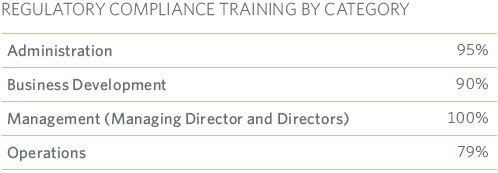
All members of the Board of Directors and Management Committee have received information and training on anti-corruption policies and procedures.
A Compliance training course was delivered in 2019, which included information on anti-corruption. The training was followed by 85% of the staff.
Similarly, in 2020 the entire management, including the General Manager of MRG, heads of department and the entire financial department have undergone specific training on the prevention of money laundering and the financing of terrorism.
Moreover, in all contracts with suppliers and contractors, criminal clauses on legislative compliance and criminal liability are included. In the contracts they are required to comply with legislation at all levels, labour (ORP, insurance contributions, mandatory training for the activity, etc.) and business (compliance with the tax authorities, accreditations of activity, etc.).
Point 2.4. describes in detail the involvement of the company’s Governing Bodies in anti-corruption and criminal law prevention.
Harassment and violence at work procedure
With regard to human rights, since March 2013, within the framework of the occupational risk prevention system, we have had a procedure for action in situations that could constitute harassment and violence in the workplace, aimed at preventing, identifying, investigating and, where appropriate, resolving such conduct.
Similarly, within the framework of the collective bargaining agreement in force, Article 10 sets out the principles of equality and non-discrimination in the Company.
4.4 Financial Information
MRG has shown great financial stability and resilience and delivered excellent results in 2020 despite the global pan¬demic that has afflicted the year 2020, confirming its great stability and consistency in revenue generation.
The Company reported 2020 revenues of €176 million, which is a decrease of 5% compared to 2019 and EBITDA of €139.7 million, down 4% compared to 2019. The decrease in revenue and EBITDA is mainly due to a decrease in turnover of €6 million and a decrease in other income of €4 million, both compared to 2019.
The revenue from distribution activity is the Company’s main source of income and is calculated annually based on a parametric formula that varies according to the growth in supply points and demand transmitted through the network. 99% of the customers connected to the Company’s network are domestic. As a result, the Company has proven to be very stable in the face of economic cycles, with the temperatures of the cold months of the year having the greatest impact on the final revenue figure. During 2020 temperatures in the Madrid region have been warmer than during 2019 and this is the main cause of the decrease in revenue.
The decrease in other income is due to the periodic inspections, which must be carried out every five years at each of the Company’s supply points, although they are not distributed regularly over the five years.
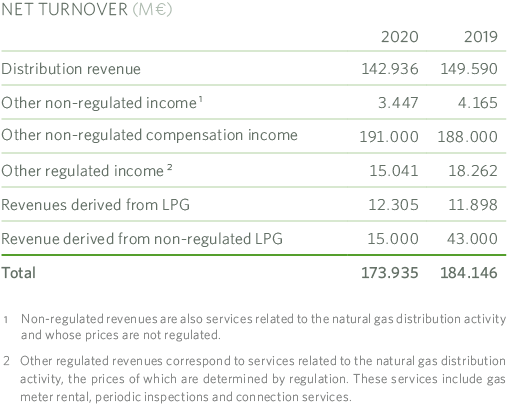

The distribution of natural gas is a regulated activity. The regulatory periods for this activity are six years. 2020 was the last year of the period that began in 2014 and is characterised by its great stability. In 2021 a new period begins where the regulatory framework has already been defined with a continuous calculation methodology. The adjustment finally published for MRG represents a cut of 10% on average in the regulatory period that begins now, similar to the main companies in the sector.
The growth strategy is focused on profitable and sustainable expansion in our territory and adjacent territories. The Company continues to grow its customer base. At the end of 2020, Madrileña Red de Gas distributed gas to 912,670 supply points, of which 890,027 were natural gas and 22,643 were liquefied petroleum gas. In 2020 we have earmarked €8.7 million for our expansion strategy.
We are also involved in other investment projects, artificial intelligence tools, digitization, process automation, and development of systems that pursue cost efficiency and improved quality and customer service.
The consortium of shareholders of the Company has not changed during the year, as indicated in chapter 2. MRG is wholly owned by Elisandra Spain V, S.L which in turn is owned by Elisandra Spain IV, S.L. which has four foreign partners.
Madrileña Red de Gas represents a long-term value creation project where the partners share the same strategic vision and commitment to long-term financial strength.
Financial strength is a fundamental pillar of the Company, where it seeks to maintain strong levels of solvency and liquidity consistent with the investment grade to which the Company is committed, balancing the level of debt with cash generation.
